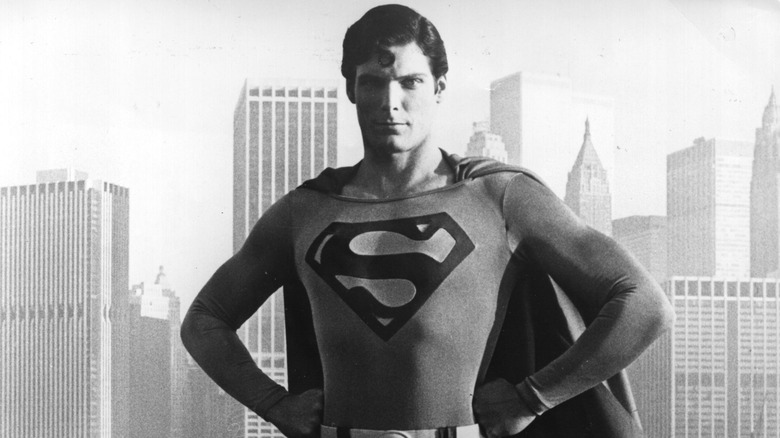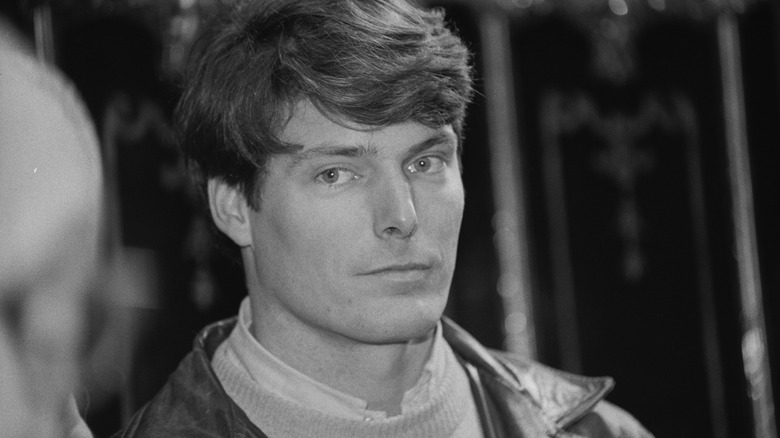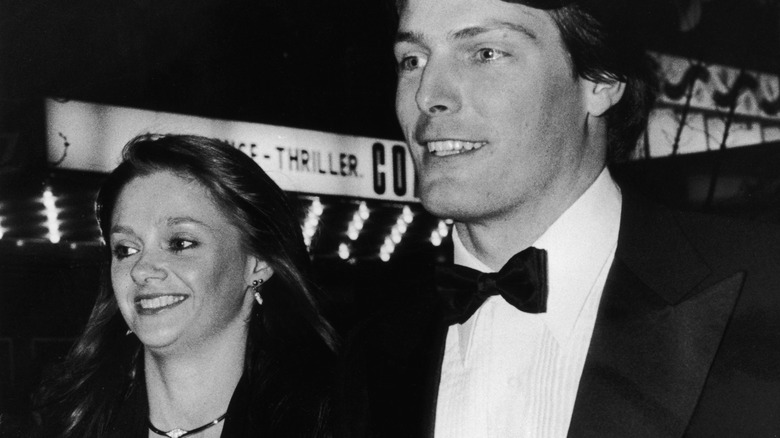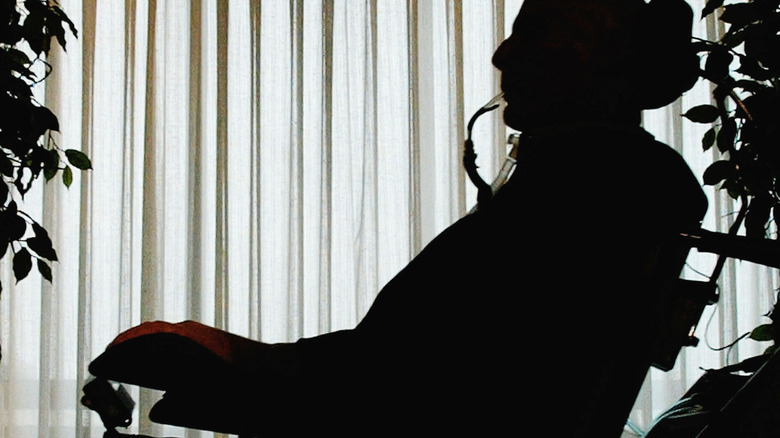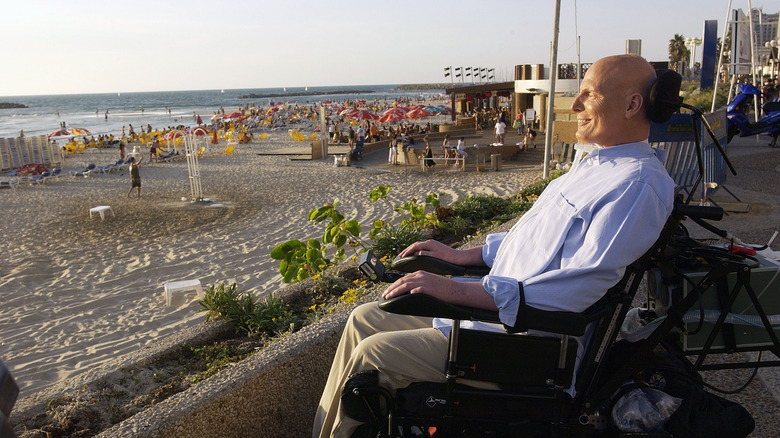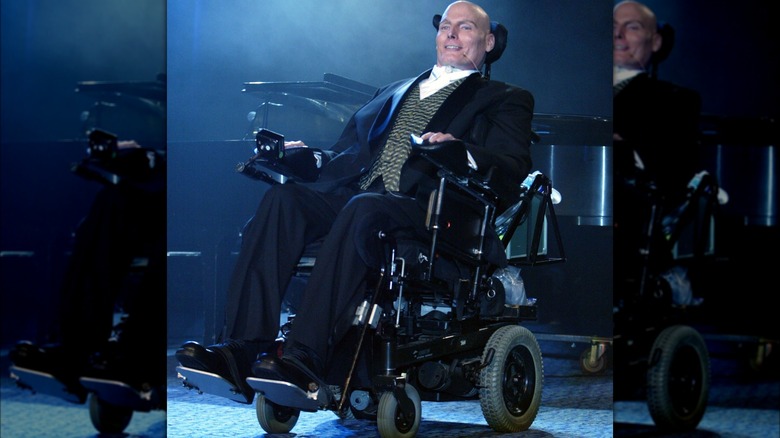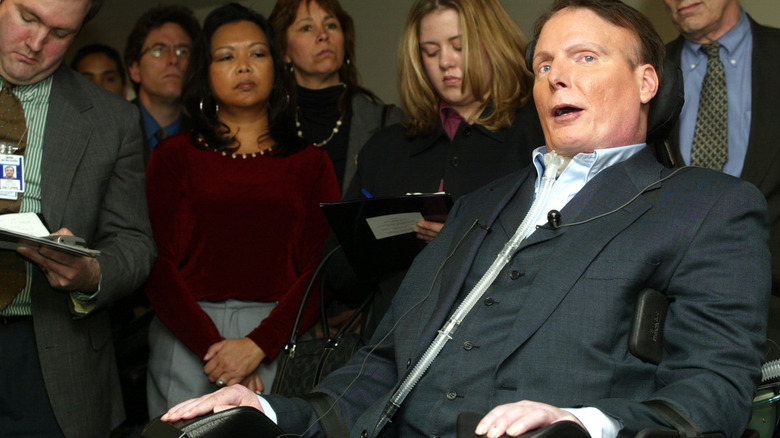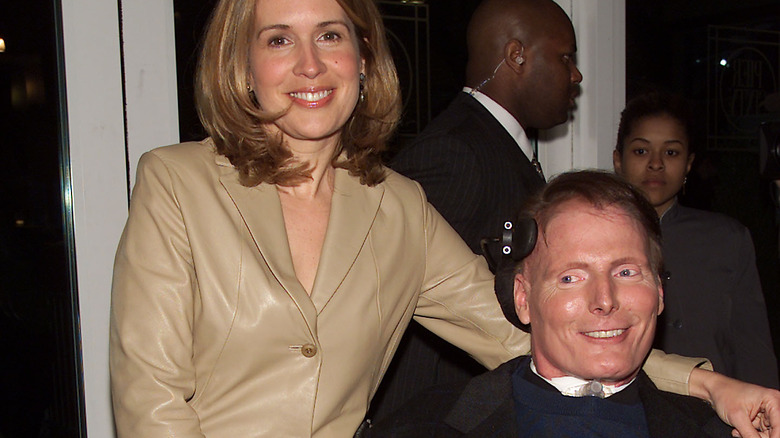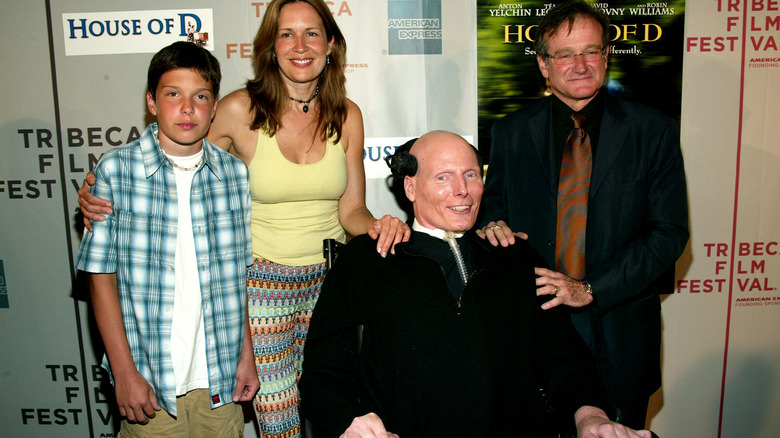The Tragic Real-Life Story Of Christopher Reeve
There was a time when it seemed like life rarely got as good as it was for Christopher Reeve. He was, after all, the embodiment of one of the most iconic superheroes ever created, and decades after he took to the screen as Superman, it's still argued whether or not it's his performance that remains the best. But still, even that was tinged with a bit of bitter sadness behind the scenes: When his father learned he'd gotten the role, he was wildly and supremely disappointed. Reeve's own theater colleagues — particularly William Hurt — told him that he was selling out by taking the part.
Then, of course, there's the elephant in the room: His 1995 accident. Reeve was thrown from his horse and paralyzed from the shoulders down, and he's been candid about how deeply devastating it was. In the documentary "Super/Man: The Christopher Reeve Story," he said (via Variety), "It dawned on me that I had ruined my life and everyone else's." That's a heavy weight to bear ... even for Superman.
There's a footnote to this, too. Reeve faced post-accident life with the invaluable support of one particularly good friend — Robin Williams. When Glenn Close was interviewed for the documentary, she said that the two were so close that she fully believed that if Reeve hadn't passed away in 2004, Williams would not have died ten years later. Ultimately, Reeve's story is one of struggles — public and private — and inspiration found in the strength of the human spirit.
He had a complicated relationship with his father
It's almost unthinkable that a father might be disappointed that his son was cast as one of the world's most iconic superheroes, but that's exactly what Christopher Reeve faced when he told his father, Franklin Reeve, about his now-famous role. When Christopher spoke with Interview Magazine about the development of his career, he said that he had taken his father out to dinner to tell him he'd been cast as Superman. Initially approving, that gave way to disapproval when he realized it wasn't a production of George Bernard Shaw's "Man and Superman."
Christopher was apparently accustomed to disapproval, once saying (via The Guardian), "It was difficult to breathe easy when he was around." In Chris Nickson's "Superhero: A Biography of Christopher Reeve," he reveals that family life was always incredibly difficult, before and after his parents' divorce. "My father and mother were always fighting over me, and therefore, canceled each other out. Consequently, I grew up not wanting to depend on them or anybody else. ... They had a tendency to use me as a chess piece.
When Christopher got along really well with his stepfather, that put an even bigger wedge between father and son. His mother's second marriage would also end in divorce, and in his biography "Somewhere in Heaven: The Remarkable Love Story of Dana and Christopher Reeve," Christopher Anderson would quote him as saying, "It did not exactly inspire confidence in the ability of men and women to have any sort of lasting relationship at all."
He felt his career was over before it started
Christopher Reeve told Interview Magazine, "People may never understand this, ... but the idea of my playing Superman is so far away from what I was brought up to aspire to." He went on to explain that "I was pushed ... in the direction of a kind of avant-garde ... theater of revolt." Although he said that he knew that wasn't really who he was, going in the complete opposite direction wasn't completely fulfilling, either.
During his youth, Reeve was somewhat of an outsider, and found theater as a place where he could be comfortable and find a place to fit in. He also had asthma, severe allergies, alopecia, and Osgood-Schlatter disease – a condition that can cause severe knee pain. As such, his background in theater and inexperience in movies made him uniquely ill-prepared for being so permanently associated with Superman.
He regretted sequels for other reasons, too. In "Somewhere in Heaven: The Remarkable Love Story of Dana and Christopher Reeve," Christopher Anderson quotes him as saying, "'Superman IV' was a catastrophe from start to finish. That failure was a huge blow to my career." When the disastrous "Switching Channels" was released the following year, Reeve saw it as "the end of my nine-year career as an above-the-line movie star." He wasn't getting calls, he wasn't getting offers, and his bid to be a star had seemingly failed.
The end of his decade-long relationship left him suffering from a deep depression
Between the release of "Superman III" and "Superman IV," Christopher Reeve found himself at a crossroads. He had been in a relationship with the mother of his two children for around a decade at that point, but they had grown apart to the point that the decision to split was made through long-distance communications. They also agreed that, while he returned to the U.S., partner Gae Exton (pictured) and their two children would live in England.
Reeve and Exton managed to keep much of it out of the media, although, according to Chris Nickson's biography, "Superhero: A Biography of Christopher Reeve," Reeve did say, "It's not sugary and fake, but we're still friends. That's really all there is to say. That is the whole truth." Still, behind the scenes, Reeve took the split incredibly hard, and struggled with depression when faced with the separation — along with his struggling career.
Christopher Anderson's "Somewhere in Heaven: The Remarkable Love Story of Dana and Christopher Reeve" adds that there was more to it than a separation. He was devastated by the idea that he was doing the same thing that his parents had, and breaking up his children's family just as his had been broken. Reeve explained, "I knew I would always be a part of their lives, but by separating, we were just acting out what I'd seen in my family, over and over again. It was painful."
An accident, a birthday, and the demon hours
Christopher Reeve was 42 years old when he took part in the ride that would change his life. In 1995, when his horse balked at a jump, Reeve went over the horse's head and broke two vertebrae in his neck, while sustaining other spinal cord injuries. Reeve would later describe it as a "hangman's injury," because it was similar to what happens when someone is dropped from the gallows.
The accident caused Reeve great mental anguish, as he related in his book "Still Me": "The thought that kept going through my mind was: I've ruined my life. I've ruined my life, and you only get one ... I'm an idiot. I've spoiled everything." More details were revealed in Christopher Anderson's book, "Somewhere in Heaven: The Remarkable Love Story of Dana and Christopher Reeve," where he says five days passed before Reeve could agree to undergo major surgery to reattach his skull and spine.
That surgery was scheduled the day after his son's third birthday, and when Reeve later watched a video of the party he hadn't been able to attend, he watched it through tears as he was confronted by the enormity of what he was going to miss. Those weeks in the hospital were very long, and revolved around what he referred to as "the demon hours." Those were the early morning hours when sedatives wore off, and there was nothing for him to do but lay awake and think.
He was candid about how difficult it was for him to face his paralysis
A few years after the riding accident that left him paralyzed, journalist Jeffrey Zaslow sat down with Christopher Reeve. As Zaslow later wrote in The Wall Street Journal, Reeve originally had no intention of living anything other than an active life, explaining, "I remember saying to my brother: 'If we couldn't have the freedom to scuba dive, to fly, to play tennis, life wouldn't be worth living. It would be better to pull the plug."
Immediately after the accident, Reeve was not alone with that thought: His mother, Barbara Johnson, after being told of the likelihood that he would be paralyzed for the rest of his life, claimed that he would want life support removed, life-saving procedures stopped, and no surgical intervention attempted.
Dana Reeve insisted that only Christopher could make that decision, and once he was fully conscious and aware, he initially agreed. According to Christopher Anderson's book, "Somewhere in Heaven: The Remarkable Love Story of Dana and Christopher Reeve," his doctor, Dr. John Jane, said, "At first, Chris wanted to die — no question. ... He didn't feel this new life he was faced with was worth living." It wasn't until Dana made a declaration of love and a promise to be by his side throughout the entire journey — regardless of what he chose — that he agreed to go through with the surgery to reattach his skull and spine.
Paralysis was just one part of the health challenges he faced
Christopher Reeve famously became an outspoken advocate for raising awareness of issues surrounding paralysis. Three years after his accident, he told The Washington Post, "We're not just sitting down. Our bodies are breaking down. And the longer you sit in a chair, the more problems arise." Reeves was very much speaking of his own circumstances, as he had already gone through some terrifying medical emergencies.
In one life-threatening instance, he had a severe allergic reaction to a new medication, and went into anaphylactic shock. The near-death experience instilled an all-encompassing fear in him; when he was faced with the necessity of unhooking his breathing apparatus and life support to move him from his bed to his wheelchair, he went through extreme anxiety.
Bedsores were common, and in one instance, a fist-sized sore reached all the way to his bones. Over those three years since the accident he had been hospitalized 11 times, and he was regularly faced with infections, blood clots, broken bones, collapsed lungs, and chronic high blood pressure aggravated by kinks in his medical equipment. He nearly lost a leg to infection, was highly susceptible to heatstroke, and lived in near-constant fear of his breathing equipment failing — which actually happened: In one incident, he was in the hospital when the hose came unhooked — and all he could do was hope someone noticed in time.
He was endlessly frustrated by setbacks in stem cell research
By 2001, legislation had put major restrictions on stem cell research, spearheaded by groups arguing that it represented an immoral destruction of human life. In response, Christopher Reeve became active in the campaign to advance such research.
Reeve was interviewed in 2003 by The BMJ about his work for the Christopher Reeve Paralysis Foundation and the promotion of stem cell research. As one of hundreds of thousands of people affected by paralysis in the U.S. and Britain alone, he said that it was a travesty that avenues had been blocked not only in the research of paralysis, but countless other conditions and illnesses that included Parkinson's, cancer, and even diabetes.
He was candid, too, about how difficult it was to watch as potentially life-changing research was blocked by groups arguing about the sanctity of life, while millions of people who may have been helped by the outcome of that research continued to suffer: "I cannot comprehend a moral objection to rescuing those embryos, literally from the garbage, in order to use them for stem cell research. I absolutely cannot understand that." He continued: "It has been really devastating to watch the pace of progress slow down because of the political controversy. I thought that hope for recovery and for the best outcome for patients would depend on science. I did not anticipate that hope would be so affected by politics."
They decided against having another child, in spite of desperately wanting one
Christopher Reeve's tragic, life-changing accident happened just before his son's third birthday, and at the time, they had a lot of things going on. Reeve was going to be starring in a version of Robert Louis Stephenson's "Kidnapped," and while he, his wife, and young son were living in Ireland, they had fully intended on having another child.
Reeve's accident changed all that, and according to what he later told The Wall Street Journal, there was a time post-accident that they had still considered adding to their family. They ultimately decided against it, for a heartbreaking reason: Reeve didn't think that it was fair for a child to grow up with a father who could never hug them.
Dana Reeve has said that although they knew they had made the right decision for them, it was still difficult. "We long for the other life," she explained, saying that they both found their days buoyed by memories of before, along with the support of friends and family, and the many, many letters they received from people who were going through some of the same challenges. She also noted that there were always the dreams — and in his dreams, he could once again do all the things that he had loved to do.
Christopher Reeve's death
Christopher Reeve (pictured in 2004 with his wife, son, and Robin Williams) died on October 10, 2004, and he had been hospitalized at the time of his death. The official cause was complications from an infection that arose from a pressure wound that he was being treated for, and it's chilling stuff. Pressure sores are an incredibly common yet potentially deadly complication that could develop from something as simple as a bruise, which might go unnoticed by paralysed patients due to the lack of sensation. In Reeve's case, despite treatment, the fatal infection spread throughout his system.
His death came the year after he had opted for surgery that would allow him to breathe on his own, and just a month before his passing, he had told Oprah Winfrey that he was optimistic that he would walk again (per The New York Times). That, in fact, had been one of his longtime goals — he had often said that one day, he wanted to be able to hold a glass and toast everyone who had helped him on his journey.
Reeve was 52 years old at the time of his death, after which his wife, Dana Reeve, issued a statement (via The Guardian) thanking not only the medical personnel that had worked with their family over the previous decade, but "the millions of fans from around the world who have supported and loved my husband over the years."
His wife died 17 months after him, after being diagnosed with lung cancer
Christopher and Dana Reeve married in 1992, three years before she became his caretaker, champion, and an advocate for others: At the time of his death, they had raised more than $46.5 million for medical research. Then, just 10 months after his death, she was diagnosed with lung cancer — in spite of being a lifelong nonsmoker. Dana died 17 months after Christopher, leaving behind their teenage son, Will.
Before her death, Dana had spoken to The Wall Street Journal about her diagnosis and how it had changed the way she saw his struggles. "As a caregiver, I always thought I had empathy for Chris's situation, ... but as I go through various tests and discomforts and uncertainty about the future that cancer can bring, I feel a strong, visceral connection to what Chris went through," she said.
In 2018, their son, Will Reeve, wrote a letter to his 13-year-old self (via CBS News). He wrote (in part) of his memories: "You're in a hospital room in New York City, and you've just said your final goodbye to Mom. You're 13. She's 44, Lung cancer. Never smoked. Gone, just like Dad, who died a year-and-a-half ago, which at the time was the lowest you had been. Now you're at a new bottom and you're terrified and confused and just so sad. But! Here's the good news: this is the low point. There's nowhere to go but up."
